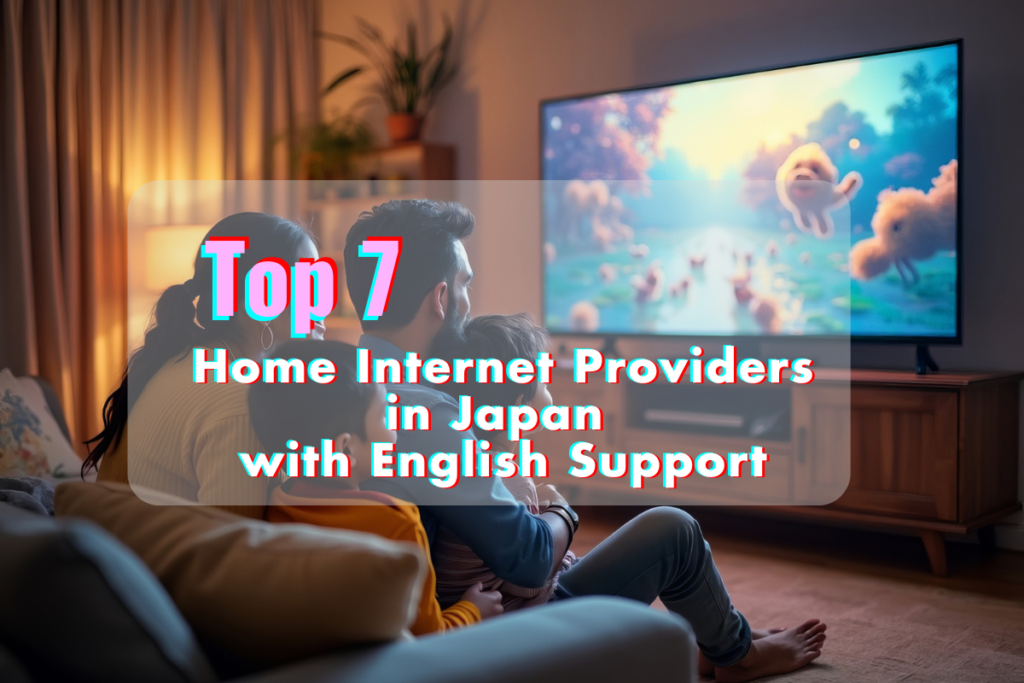Updated: 2025/2/28
Looking for home internet options in Japan can be confusing, even for locals. Sometimes if you encounter a rare case where the contract and service explanations are available in English, the complex terms are confusing and overwhelming.
If you settle for a large provider without fully understanding the details, you could be locked into a two-year contract and have to pay a hefty fee for early cancellation. Unexpected add-ons may also drive up your monthly bills.
This article aims to explain Japan’s home internet services clearly while comparing Japan’s best internet providers to help you make an informed decision.
Let’s dive in!
In this article, we’ll cover:
- Home Internet Options in Japan
- Japan’s Top 7 Home Internet Providers: An Overview
- Japan’s Top 7 Home Internet Providers
- Which internet provider should I choose?
- Japan Home Internet Services FAQ
- Handy Japanese Vocabulary for Home Internet Services
- Conclusion: Which Home Internet Provider Should I Choose?
TL;DR
Which provider should I choose?
Choose Sakura Mobile if you:
- Only need up to 40GB per month
- Want to save money
- Need reliable English support 7 days a week
Choose SoftBank or au if you:
- Require unlimited data
- Don’t mind higher fees
- Are comfortable communicating in Japanese
1. Home Internet Options in Japan

If you’re searching for home internet, you have two choices: fiber (wired) or pocket WiFi (wireless).
Fiber vs. Pocket WiFi: Which Is Best for Your Home Internet Needs?
Fiber internet uses fiber-optic lines installed in your house or apartment, offering speeds ranging from 100 to 700 Mbps. There are no data caps, so you can use it without worrying about running out of data. While it’s a wired connection, you can still enjoy wireless internet by connecting to a WiFi router.
Portable WiFi or mobile hotspots are known as Pocket WiFi in Japan. These devices rely on a mobile network, making them slower than fiber internet. They also come with data caps, which reduce speeds once you’ve used up your data. However, since they are portable, they are handy for on-the-go situations.
Whether a Pocket WiFi unit will be enough for your home use depends on how much speed and data you need.

Here’s a simple comparison of these two types of internet services.
Scroll right for more →→
| Feature | Fiber Internet | Pocket WiFi |
| Internet Speed | High | Low to Medium |
| Cost | Medium to High | Low to High |
| Mobility | Home-use Only | Portable — Use Anywhere |
| Data Cap | Unlimited Data | Up to 100 GB per Month |
Related Articles
↑ Go back to the table of contents
2. Japan’s Top 7 Home Internet Providers: An Overview

Scroll right for more →→
| Service Name | Monthly Fee | Initial Fee | Contract Length | Max Speed | English Support | Fiber Network Type | Coverage |
| Sakura Fiber Internet | 7,128 JPY | 7,700 ~ 29,700 JPY | 1 Month | 1 Gbps | Full English Support | NTT Flet's Hikari | Over 90% |
| SpinNet | 5,500 ~ 14,300 JPY | 11,440 ~ 27,280 JPY | Unknown | 1 Gbps | Some English Support | NTT Flet's Hikari | Over 90% |
| Asahi Net | 6,358 JPY | 20,680 JPY | 2 Years | 1 Gbps | Some English Support | NTT Flet's Hikari | Over 90% |
| SoftBank Hikari | 7,322 JPY | 5,500 ~ 29,700 JPY | 2 Years | 1 Gbps | Japanese Only | NTT Flet's Hikari | Over 90% |
| au Hikari | 6,270 JPY | 44,550 JPY | 2 Years | 1 Gbps | Japanese Only | au Hikari | 60% |
| NURO Hikari | 5,217 JPY | 47,300 JPY | 2 Years | 2 Gbps | Japanese Only | NURO Hikari | 40% |
| docomo Hikari | 5,720 JPY | 23,100 JPY | 2 Years | 1 Gbps | Japanese Only | NTT Flet's Hikari | Over 90% |
Note:
- *All prices listed include tax.
- *The monthly fee includes the base fee, ISP fee, and WiFi router rental.
- *The monthly fee is a comparison of the house-type fiber internet option of each provider.
- *The initial fee includes the administrative fee and installation fee.
- *This chart does not include smartphone bundle discounts and other discounts that require specific conditions to be met.
Let’s dive deeper into the key factors to consider when choosing your internet service, such as connection speed, data caps, and fees.
Types of Fiber Networks
Japan has three major fiber-optic networks: NTT FLET’S Hikari, au Hikari, and NURO Hikari. NTT FLET’S Hikari is the most widely used. As the largest telecommunications company in Japan, NTT EAST/WEST provides the network with the highest coverage. Many internet providers use NTT FLET’S Hikari, offering customers a variety of popular plans.
Fastest Internet Speeds in Japan
We understand that you want the fastest possible internet speed.
The comparison table shows that all listed providers offer similar connection speeds of around 1 to 2 Gbps — the maximum speed available in Japan. However, this is a theoretical limit. Your actual speed will vary depending on factors like your device, router, and distance from the base station.
From the above list, you can generally expect a range of speeds from 100 to 700 Mbps. For context, a speed of 100 Mbps is sufficient for streaming Netflix and playing online games smoothly.
The chart below illustrates what you can do with various internet speeds.
Scroll right for more →→
| Activity | Recommended Speed |
| 4K Video Streaming/Online Gaming | 25 Mbps |
| Online Meetings | 10 Mbps |
| HD Video Streaming (1080p) | 5 Mbps |
| Web Browsing/Emails/Messaging Apps | 1 Mbps |
Although NURO Hikari offers the fastest internet service in Japan with speeds up to 2 Gbps, its coverage only extends to about 40% of the country. Even in covered areas, some apartments may not be eligible for the service.
Home Internet Providers Data Caps in Japan
Fiber internet typically does not have data caps. While some providers offer specific light-use plans that include data limits, most fiber internet plans allow unlimited data usage.
Home Internet Costs and Fees in Japan
Most fiber internet plans have two main fees; initial and monthly.
Initial fees typically include administrative and installation fees, totaling between 10,000 and 40,000 yen. The comparison table includes these combined fees for each service.
Monthly fees vary by residence type: apartment or single-family house.
Apartment internet usually costs between 4,500 and 5,500 yen per month, while single-family house internet, which often requires a stronger connection, ranges from 5,200 to 7,000 yen per month.
If you need WiFi, renting a router will cost 500 to 1,000 yen per month. The monthly fees shown in the comparison table for single-family house plans include the WiFi router rental.
Home Internet Contracts in Japan
Signing up for fiber internet usually means committing to a 2 to 3-year contract. However, cancellation needs to be done at the renewal point; otherwise, you’ll face a penalty fee.
(Ex. 2-year contract)
- Months 0–23: Penalty
- Month 24: No Penalty
- Months 25–47: Penalty
- Month 48: No Penalty
The penalty typically ranges from 10,000 to 30,000 yen.
Sakura Fiber Internet is the only service in our comparison table offering full English support with no fixed contract.
Home Internet Services in Japan with English Support
Only a few internet providers in Japan offer full English customer support, such as Sakura Fiber Internet. While some may have English websites, Japanese is usually required for phone support and accessing user login pages.
↑ Go back to the table of contents
3. Japan’s Top 7 Home Internet Providers

Below is a detailed explanation of each internet service, the average connection speed of which is based on data from Minsoku. (A Japanese review site that calculates speeds using data from over 10,000 users)
Sakura Fiber Internet

| Name | Sakura Fiber Internet |
| Monthly Fee (tax inc.) | 7,128 JPY |
| Initial Fee | From 7,700 to 29,700 JPY |
| Minimum Contract Length | 1 Month |
| Average Speed | Upload: 206 Mbps Download: 274 Mbps* |
| English Support | Full English support |
| Network | NTT FLET’S Hikari |
*From FLET’S Hikari Next as of 12/22/2021 as listed in Minsoku.
Sakura Fiber Internet is a service provided by Sakura Mobile, a company offering phone services to international residents in Japan. While the monthly fee is slightly higher than other providers, it comes with several advantages:
- Full English support
- A minimum usage period of just one month, after which you can cancel anytime
- Free WiFi router rental
- Pocket WiFi is available until internet installation is complete
You can also receive a discount of up to 18,590 yen on the initial fee if you sign up for Sakura Mobile’s phone plan!
Learn More below
↑ Go back to the table of contents
SpinNet: Popular with Frequent Travelers
| Name | SpinNet |
| Monthly Fee (tax inc.) | 5,500 to 14,300 JPY |
| Initial Fee | From 5,500 to 27,280 JPY |
| Minimum Contract Length | Unknown |
| Average Speed | Upload: 206 Mbps Download: 274 Mbps* |
| English Support | Some English support |
| Network | NTT FLET’S Hikari |
*From FLET’S Hikari Next as of 12/22/2021 as listed in Minsoku.
SpinNet offers English support through SoftBank. It uses the FLET’S Hikari network, providing stable, high-speed internet.
Customers signing up for fiber internet with SpinNet can earn ANA Mileage Club miles monthly. Since ANA is part of the Star Alliance, this could be beneficial if you want to accumulate miles despite higher monthly fees.
↑ Go back to the table of contents
Asahi Net: Full English Support + 2-Year Contract
| Name | Asahi Net |
| Monthly Fee (tax inc.) | 6,358 JPY |
| Initial Fee | 20,680 JPY |
| Minimum Contract Length | 2 years |
| Average Speed | Upload: 189 Mbps Download: 232 Mbps* |
| English Support | Some English support |
| Network | NTT FLET’S Hikari |
*From AsahiNet Hikari as of 12/22/2021 as listed in Minsoku.
Asahi Net, a service by the Asahi Shimbun Group, has been in business since 1994. It is the only major provider offering full customer support in English. While the service fee is more average, the two-year fixed contract makes it ideal for those planning to stay in Japan long-term.
↑ Go back to the table of contents
SoftBank Hikari: Popular with Softbank Customers
| Name | SoftBank Hikari |
| Monthly Fee (tax inc.) | 7,322 JPY |
| Initial Fee | From 5,500 to 29,700 JPY |
| Minimum Contract Length | 2 years |
| Average Speed | Upload: 214 Mbps Download: 317 Mbps* |
| English Support | Japanese only |
| Network | NTT FLET’S Hikari |
*From SoftBank Hikari as of 12/22/2021 as listed in Minsoku.
This fiber internet service is offered by SoftBank, one of Japan’s three major mobile carriers. Customers who bundle it with a SoftBank phone plan can save 500 yen monthly on their phone bill. This service could be a good choice if you already have a SoftBank phone contract.
↑ Go back to the table of contents
au Hikari: Fast Internet Speeds
| Name | au Hikari |
| Monthly Fee (tax inc.) | 6,270 JPY |
| Initial Fee | 44,550 JPY |
| Minimum Contract Length | 2 years |
| Average Speed | Upload: 362 Mbps Download: 421 Mbps* |
| English Support | Japanese only |
| Network | au Hikari |
*From au Hikari as of 12/22/2021 as listed in Minsoku.
au Hikari, provided by au, Japan’s second-largest mobile carrier, offers fiber internet via its own network. It has faster speeds but has a limited coverage area.
au Hikari is not available in Shizuoka, Aichi, Gifu, Mie, Osaka, Kyoto, Hyogo, Wakayama, Nara, Shiga, and Okinawa.
Check with your apartment manager to confirm availability. Due to needing special equipment it may not be available in certain apartments within the service area.
↑ Go back to the table of contents
NURO Hikari: Japan’s Fastest Internet Speeds
| Name | NURO Hikari |
| Monthly Fee (tax inc.) | 5,217 JPY |
| Initial Fee | 47,300 JPY |
| Minimum Contract Length | 2 years |
| Average Speed | Upload: 449 Mbps Download: 503 Mbps* |
| English Support | Japanese only |
| Network | NURO Hikari |
*From FLET’S Hikari Next as of 12/22/2021 as listed in Minsoku.
NURO Hikari, a fiber internet service from So-net (a Sony Group member), uses its own line and delivers the fastest speeds in Japan. While you may not notice these speeds during everyday tasks like browsing or streaming, NURO Hikari benefits activities requiring low latency, such as multiplayer online gaming. Like au Hikari, its service area is limited.
Learn how NURO Hikari stands out and compares to other providers in our Guide to NURO Hikari!🌐✨
↑ Go back to the table of contents
docomo Hikari: Popular with docomo Customers
| Name | docomo Hikari |
| Monthly Fee (tax inc.) | 5,720 JPY |
| Initial Fee | 23,100 JPY |
| Minimum Contract Length | 2 years |
| Average Speed | Upload: 209 Mbps Download: 268 Mbps* |
| English Support | Japanese only |
| Network | NTT FLET'S Hikari |
*From FLET’S Hikari Next as of 12/22/2021 as listed in Minsoku.
This fiber internet service is provided by docomo, Japan’s largest mobile carrier. The monthly fee is relatively low, and if bundled with a docomo smartphone plan, you can save an additional 500 yen per month on your phone bill. If you’re a docomo customer, this service is worth considering.
↑ Go back to the table of contents
SoftBank Air: No Installation Required
| Name | SoftBank Air |
| Monthly Fee (tax inc.) | 5,368 JPY |
| Initial Fee | 3,300 JPY |
| Minimum Contract Length | 2 years |
| Average Speed | Upload: 6 Mbps Download: 49 Mbps* |
| English Support | Japanese only |
| Network | Wireless City Planning |
*From FLET’S Hikari Next as of 12/22/2021 as listed in Minsoku.
SoftBank Air is a wireless internet service that requires no installation, allowing you to use your WiFi router immediately upon receipt. Unlike fiber internet, SoftBank Air operates on the mobile network of Wireless City Planning Inc., not SoftBank’s. This makes the speed slower than that of fiber internet, and a more limited coverage area. Be sure to check whether your area is covered before choosing this service.
↑ Go back to the table of contents
4. Which internet provider should I choose?

If you:
- Want to avoid a two-year contract and penalty fees.
- Are not confident in your Japanese.
- Don’t want to deal with building management for internet installation.
- Want the highest quality fiber internet in Japan.
In that case, we recommend Sakura Fiber Internet.
Sakura Fiber Internet has
- Fast Internet Connection
- No 2-Year Binding Contract
- Reliable English Support
- Simple, Stress-Free Installation
- Flexible Payment Methods
Sakura Fiber Internet covers over 90% of populated areas in Japan.
Check Availability for Your Address here.
If Sakura Fiber Internet Isn’t for You
Other providers might better suit your needs if:
- You don’t mind a two-year contract.
- You’re comfortable communicating in Japanese.
- You’re okay with coordinating installation with building management.
- You’re less concerned about the quality of your internet connection.
In these cases, we suggest au Hikari, SoftBank Hikari, or docomo Hikari. If you sign up through your smartphone plan, these services can be 500 yen cheaper per month. You should consider choosing based on your current phone plan.
5. Japan Home Internet Services FAQ

How long does it take to install fiber internet?
Once you apply for fiber internet, it typically takes 2 weeks to 1 month before you can use the service. Here’s the general process:
- Apply on the internet provider’s website
- Within 2 to 3 days, you will receive a call to confirm if your area is covered, explain installation procedures, and provide an estimate of your total costs.
- Within 2 weeks to 1 month, an electrician will visit your home to install the internet, and you can start using the service.
With Sakura Fiber Internet, you can rent a pocket WiFi device until you are able to use your fiber internet.
How to set up WiFi at home?
To use WiFi at home, you’ll need a WiFi router.

With Sakura Fiber Internet, the router rental fee is included in your monthly payment, so you don’t need to prepare anything yourself.
Here’s an instructional video on setting up Sakura Fiber Internet:
![]() Click below to play YouTube video↓↓
Click below to play YouTube video↓↓
Are there internet restrictions in Japan?
Japan has a mostly open internet with minimal restrictions. Illegal contents are blocked, and there are strict copyright laws. However, general access to websites and services remains unrestricted.
↑ Go back to the table of contents
6. Handy Japanese Vocabulary for Home Internet Services

Here are some useful Japanese terms to know when signing up for fiber internet in Japan, especially if your provider doesn’t offer English support.
- 光回線 (hikari-kaisen) refers to fiber-optic internet. “Hikari” means fiber-optic, and “kaisen” means internet. It’s often shortened to just “hikari,” like in SoftBank HIKARI, SoftBank’s fiber internet brand.
- 無線(musen) means wireless, referring to an internet connection through a wireless router.
- 有線 (yusen) refers to a wired internet connection using a LAN cable, the opposite of wireless.
- フレッツ (flets) is the brand name for docomo’s optical fiber line.
- 戸建て (kodate) means a detached house, usually a larger family home.
- アパート (apaato) refers to an apartment with relatively low rent, typically 2–3 stories tall and made of wood or light steel. Units are usually rented, not owned.
- マンション (manshon) refers to a larger apartment building, at least 3 stories tall, built with a steel frame or reinforced concrete. Most residents own their units and participate in building decisions.
↑ Go back to the table of contents
7. Conclusion: Which Home Internet Provider Should I Choose?

So, did you find the internet provider that best fits your needs?
Feel free to contact us if you have any concerns or questions regarding internet service.
Our team will be happy to support you!
We hope that now you are a little bit more informed about different internet providers in Japan.
Conclusion: Which internet provider should I choose?
- The Overall Best Choice
With fast speeds, full English support, and no two-year contract, Sakura Fiber Internet is our top recommendation. We’re confident you’ll be happy with your choice!
- Runner Ups
docomo Hikari, au Hikari, SoftBank Hikari are reliable options as well. Plus, you could save 500 yen a month by bundling with a cellphone plan from the same provider.
- Others:
Depending on your location and needs, SpinNet, NURO Hikari, Asahi Net might also be worth considering.
Questions?
We hope this guide has made it easier for you to navigate internet providers in Japan. If you have any questions about home internet service in Japan, feel free to contact us — our team is here to help!
Related articles
- Fiber Internet vs. Pocket WiFi in Japan: Which Should I Choose?
- Best Long-Term Pocket WiFi Plans in Japan 2021
- What is NTT FLET’S Hikari Internet? | 5 Things To Know Before Applying
- Guide to SoftBank Hikari | Prices, Reviews and How to Apply
- Guide to NURO Hikari | Prices, Reviews and How to Apply
- Guide to au HIKARI | Prices, Reviews and How to Apply
- Guide to Rakuten Hikari | Prices, Reviews and How to Apply
CUSTOMER’S VOICE


